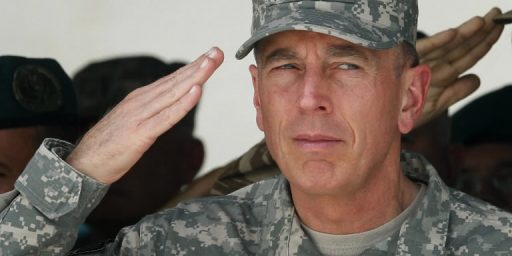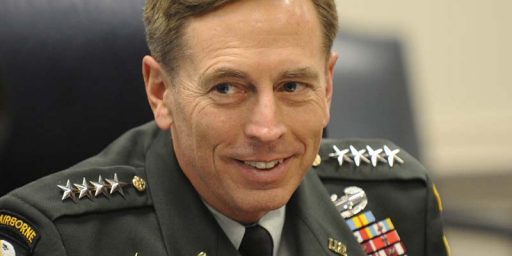Petraeus Says War Will Take Years
General David Petraeus says that the Surge is going as planned but it may take years, even decades, to win the war.
“Northern Ireland, I think, taught you that very well. My counterparts in your [British] forces really understand this kind of operation… It took a long time, decades,” he said. “I don’t know whether this will be decades, but the average counter insurgency is somewhere around a nine or a 10 year endeavour.”
He went on to say that more important than the length of time it would take to stabilise Iraq was the number of US troops which would be required to remain in the country. “I think the question is at what level… and really, the question is how can we gradually reduce our forces so we reduce the strain on the army, on the nation and so forth,” he said.
He said everyone wanted the US forces to be able to leave, both Americans and Iraqis alike, but he said it was vital to ensure that “the gains that have been hard fought in places like Baquba and Ramadi could be sustained, maintained and even built on by Iraqi forces and Iraqi political leaders”.
There is a video of the interview and more details at the link. Petraeus is almost certainly right on the timeline, presuming the war can be won at all at this point. But that rather begs the question: Is it at all conceivable that the political will to remain in Iraq for years, even decades, can be mustered? It seems rather clear that it can’t. And, surely, Petraeus is keenly aware of the politics involved.
One would be sorely tempted to think Petraeus’ rhetoric designed to lay the groundwork for an exit strategy? had it not coincided with some a sterner warning from the U.S. Ambassador.
Two months before a pivotal assessment of progress in the war that he and the overall American military commander in Iraq are to make to the White House and Congress in September, Ryan C. Crocker, the ambassador, laid out a grim forecast of what could happen if the policy debate in Washington led to a significant pullback or even withdrawal of American forces, perhaps to bases outside the major cities.
“You can’t build a whole policy on a fear of a negative, but, boy, you’ve really got to account for it,” Mr. Crocker said Saturday in an interview at his office in Saddam Hussein’s old Republican Palace, now the seat of American power here. Setting out what he said was not a policy prescription but a review of issues that needed to be weighed, the ambassador compared Iraq’s current violence to the early scenes of a gruesome movie.
“In the States, it’s like we’re in the last half of the third reel of a three-reel movie, and all we have to do is decide we’re done here, and the credits come up, and the lights come on, and we leave the theater and go on to something else,” he said. “Whereas out here, you’re just getting into the first reel of five reels,” he added, “and as ugly as the first reel has been, the other four and a half are going to be way, way worse.”
Hoshyar Zebari, the foreign minister, sounded a similar warning at a Baghdad news conference on Monday. “The dangers vary from civil war to dividing the country or maybe to regional wars,” he said, referring to an American withdrawal. “In our estimation the danger is huge. Until the Iraqi forces and institutions complete their readiness, there is a responsibility on the U.S. and other countries to stand by the Iraqi government and the Iraqi people to help build up their capabilities.”
[…]
The ambassador also suggested what is likely to be another core element of the approach that he and General Petraeus will take to the September report: that the so-called benchmarks for Iraqi government performance set by Congress in a defense authorization bill this spring may not be the best way of assessing whether the United States has a partner in the Baghdad government that warrants continued American military backing. “The longer I’m here, the more I’m persuaded that Iraq cannot be analyzed by these kind of discrete benchmarks,” he said.
Crocker is likely right, too. But it leaves us with a strange paradox: Staying in Iraq will mean continued American casualties in a war the public clearly no longer supports and will require several more years of such commitment to achieve victory, however that’s defined, with no guarantee that said victory will be achieved and, worse still, no ready benchmarks to even know. Leaving Iraq will almost certainly mean a rapid deterioration in the security situation and the death of many more Iraqis. And, given that the situation was precipitated by our invasion and toppling of the previous regime, we would have a heavy moral responsibility.
This is a classic No Win scenario for which there are no easy answers.
Alex Knapp, Sean Hackbarth, and I talked about this issue for the first half of last night’s installment of OTB radio. You can listen to the podcast here or go to the extended entry where it will auto-launch.
UPDATE: Steve Bainbridge wins the Best Star Trek Reference Award for working “Kobayashi Maru” into his post title.






Perhaps he is laying the ground work for an honest debate on the subject. Here is the cost to get the job done (as best he can see it now). Whether we as a nation want to pay the cost, it is pretty hard to make the argument that we can’t pay the cost. The other side of this is the costs and benefits of staying/going. Both positions have positives and negatives.
Staying is going to cost blood and money. Leaving is going to cost blood and money. The question is as much whose blood, whose money and ripple effects.
Brought to you by… hmm, can’t quite recall the guy’s name. Oh, yeah, “mistakes were made.”
BTW, the automatic play on the blog radio thingy is quite annoying.
James,
As Northern Ireland has been mentioned I think its worth remembering that throughout the 70s and 80s British Army troop levels were in or around 50,000. That was to police a male catholic population (their area of operations for the most part) of under 350,000, if my math is correct that works out at one soldier per 7 civilians, and still it took over thirty years to reach a stalemate.
The equivalent in Iraq is 2.7 million male sunni Iraqis and an American troop presence of, say, 150,000, that’s a 1 to 18 ratio, without taking in Al Qaeda or the Shia militias.
Whoops, I should have posted this here:
Petraeus and the other generals are turning out to be as mendacious as the politicians. They simply haven’t been honest with the public about the costs and the time frames for our involvement.
“As Northern Ireland has been mentioned I think its worth remembering that throughout the 70s and 80s British Army troop levels were in or around 50,000. ”
Nah , UK troop strength in NI peaked at 30,000 in july 1972 (up from 11,000 in 1971) and then dropped to around 22,000 for the rest of the seventies and then down to an average of around 16,000 or so in the 80’s. And around 30% of those uk troops were actually part time locals in the UDR.
So the highest ratio in NI would been around 1:12 for a few months in 1972 and nearer 1:18- 1:20 for the rest.